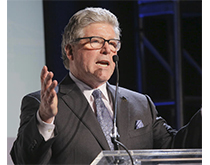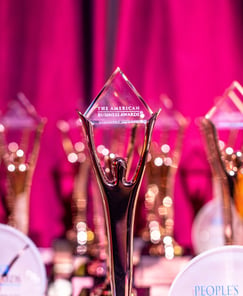Founder’s Journey: How Michael Gallagher Built the Stevie Awards 20 Years Ago from the Ground Up

Today, the Stevie® Awards are widely known as the world's premier business awards, but the journey to get here did not come without risks, challenges, clear goals, determination, and a dedicated team.
Michael Gallagher founded the Stevie Awards in 2002 to honor and generate public recognition of the achievements and positive contributions of organizations and working professionals worldwide. Thousands of nominations are submitted year after year in a myriad of categories across eight Stevie Awards programs. All organizations—public and private, for-profit and non-profit, large and small—may submit nominations. Entries detailing everything from achievement in product innovation, thought leadership, creative marketing campaigns, outstanding customer service, entrepreneurial ventures, and more recently, COVID-19 response, are reviewed by our respected group of judges.
Past notable Stevie Award winners include Aflac, Apple, Chipotle, Bank of America, Ford Motor Company, IBM, ING, PayPal, Procter & Gamble, Roche Group, Samsung, and Verizon, among many others. In short order, the crystal pyramid-topped Stevie trophy has become one of the most coveted prizes in the business world. 
In the following interview responses, Michael Gallagher shares his personal background and experiences that molded the foundation and core values of the Stevie Awards.
How and why did you come up with the idea to found the Stevie Awards?
I was at a point in my life where I needed to find something else to do, after working for other people since I was 16. I enjoyed working for a company called The New York Festivals for six years in the ‘80s that staged awards for video, advertising, radio, television, and other media, and thought, I enjoyed that, but the world doesn’t need any more film festivals. But why isn’t there an “Oscars” for business?
What was your previous business experience and background before you founded the Stevie Awards?
After working for The New York Festivals for six years, I moved to the Washington, DC area and worked in the tradeshow and conference industry for seven years, then in the dot-com world in various marketing and sales roles through 2001.
What were some of your goals for the Stevie Awards when you first started the organization? Have they come to fruition and/or evolved since then?
I wanted them to become known as the “Oscars for business,” and to some extent, we’ve achieved that, but of course, we’re not as well known yet as the Academy Awards.
What are the most challenging experiences you faced when first starting the Stevie Awards?
The first year is always the hardest for any new venture. Every process, procedure, and system has to be imagined, designed, and created for the first time. Cash was in short supply so we had to scramble for just about everything. But the advantage of having to do almost everything yourself is that you learn how to do just about everything.
How do you define success at the Stevie Awards?
A well-subscribed competition, reviewed and rated by a sufficient number of experienced professionals in the judging process, resulting in a diverse body of winners, leading to a well-attended awards ceremony that comes off without a major problem.
What is something that all Stevie Award winners have in common?
The aspiration to have their achievements recognized by a wider audience than just their colleagues.
What do the Stevie Awards mean to you?
I try not to dwell on the past too much. I think I’m very forward-thinking. I think of the Stevie Awards as a movement, rather than a company or organization. A movement toward wider public recognition of the achievements of people in the workplace, beyond the headline-grabbing billionaires who hoard so much of the news coverage of business. We’ve achieved that to a large extent in some nations and regions, and hardly at all in others. So we still have work to do.
What has surprised you most over the past 20 years with the Stevie Awards?
That I’m still doing this and enjoying every day of it.
What is your role like today compared to when you first started the Stevie Awards in 2002?
I don’t have to do everything as I did the first few years - yay! We have a good team now and I don’t fret over every little thing as I used to.
Which awards programs are most promising for future growth?
Awards programs usually grow slowly for the first few years, then grow quickly in years five through 10, say, and then grow incrementally each year after that. All eight of our programs have followed that pattern, more or less. I can’t say which of our existing programs will grow the most. Maybe it will be the ones we haven’t started yet.
What has changed the most in the past 20 years at the Stevie Awards?
There was a lot of skepticism in the early years that I’d be able to pull it off, at first, and that I’d be able to keep making it work, after that. We’re well beyond that point now. I don’t know that there are many now who doubt that the Stevie Awards are credible and here to stay.
What do you believe the next 20 years of the Stevie Awards will look like?
Wider acceptance and growth in areas that haven’t really accepted the Stevie Awards yet, such as central and South America, Japan, and other places. And a new Stevie Awards competition of some type every three to five years.
The 2022 American Business Awards® Celebrates 20 Years.












